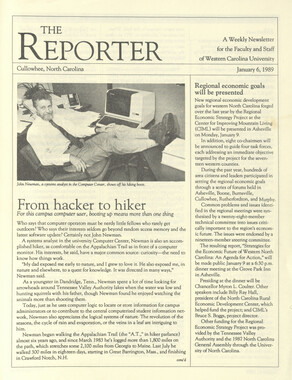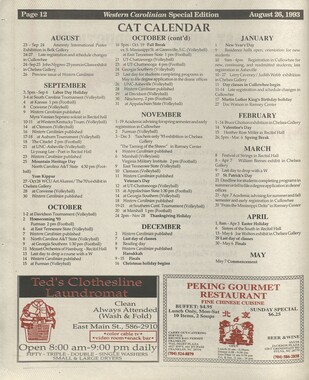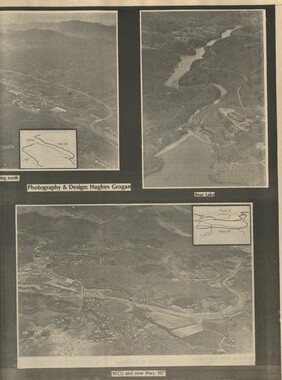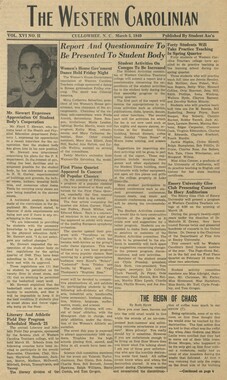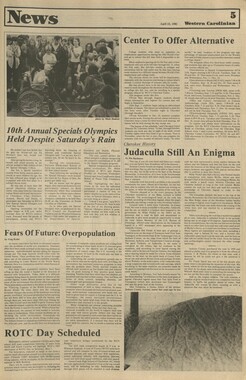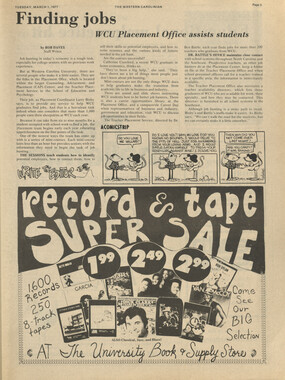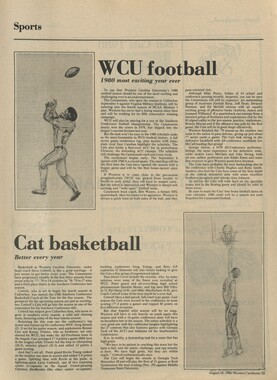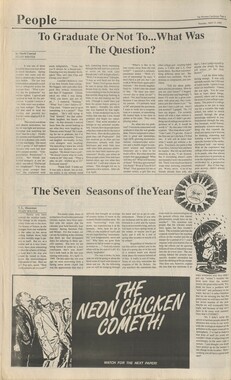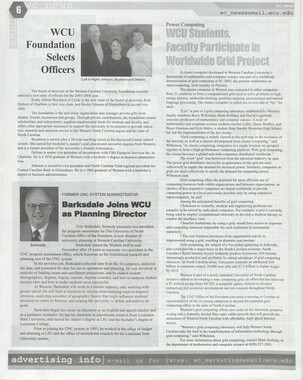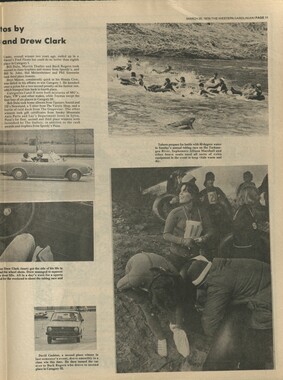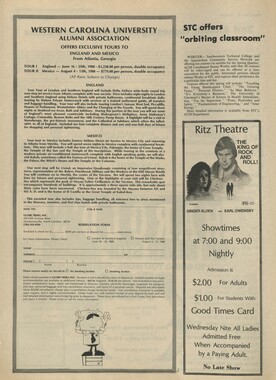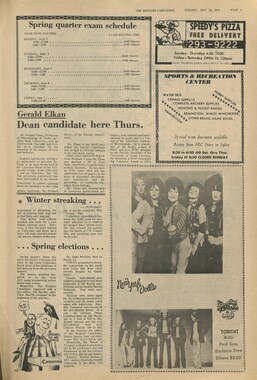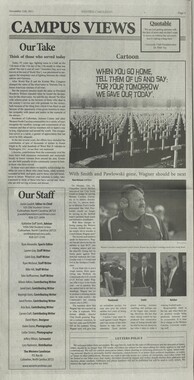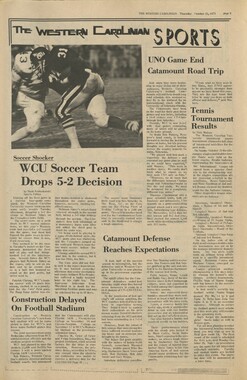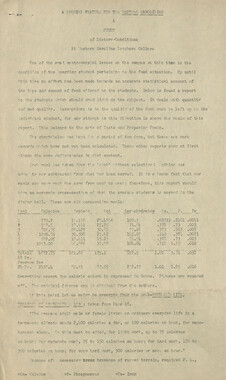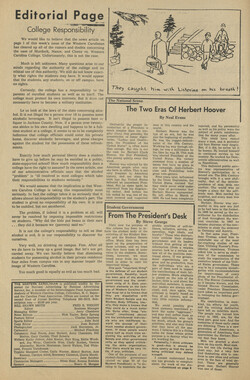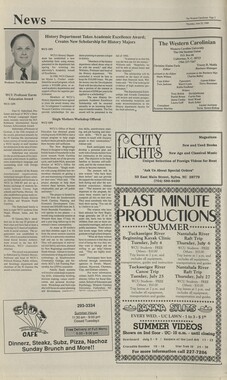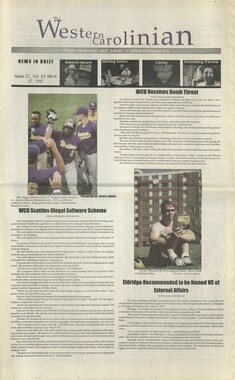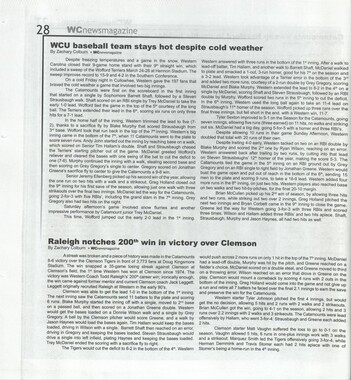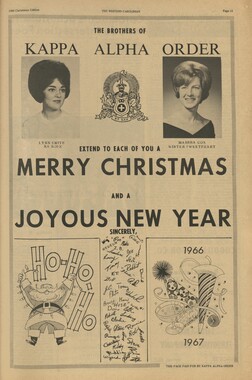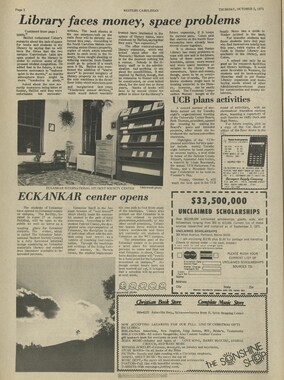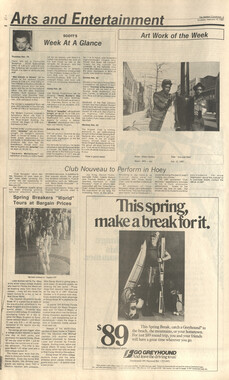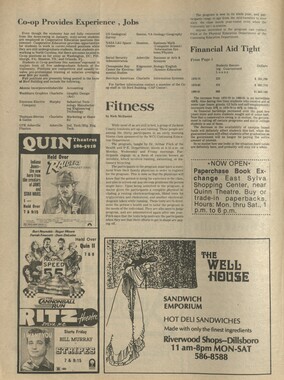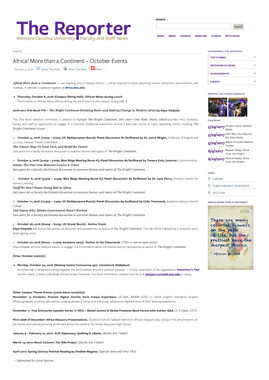Western Carolina University (20)
View all
- Canton Champion Fibre Company (2308)
- Cherokee Traditions (291)
- Civil War in Southern Appalachia (165)
- Craft Revival (1942)
- Great Smoky Mountains - A Park for America (2946)
- Highlights from Western Carolina University (430)
- Horace Kephart (941)
- Journeys Through Jackson (159)
- LGBTQIA+ Archive of Jackson County (85)
- Oral Histories of Western North Carolina (314)
- Picturing Appalachia (6873)
- Stories of Mountain Folk (413)
- Travel Western North Carolina (160)
- Western Carolina University Fine Art Museum Vitreograph Collection (129)
- Western Carolina University Herbarium (92)
- Western Carolina University: Making Memories (738)
- Western Carolina University Publications (2491)
- Western Carolina University Restricted Electronic Theses and Dissertations (146)
- Western North Carolina Regional Maps (71)
- World War II in Southern Appalachia (131)
University of North Carolina Asheville (6)
View all
- Allanstand Cottage Industries (62)
- Appalachian National Park Association (53)
- Bennett, Kelly, 1890-1974 (1463)
- Berry, Walter (76)
- Brasstown Carvers (40)
- Carver, George Washington, 1864?-1943 (26)
- Cathey, Joseph, 1803-1874 (1)
- Champion Fibre Company (233)
- Champion Paper and Fibre Company (297)
- Cherokee Indian Fair Association (16)
- Cherokee Language Program (22)
- Crowe, Amanda (40)
- Edmonston, Thomas Benton, 1842-1907 (7)
- Ensley, A. L. (Abraham Lincoln), 1865-1948 (275)
- Fromer, Irving Rhodes, 1913-1994 (70)
- George Butz (BFS 1907) (46)
- Goodrich, Frances Louisa (120)
- Grant, George Alexander, 1891-1964 (96)
- Heard, Marian Gladys (60)
- Kephart, Calvin, 1883-1969 (15)
- Kephart, Horace, 1862-1931 (313)
- Kephart, Laura, 1862-1954 (39)
- Laney, Gideon Thomas, 1889-1976 (439)
- Masa, George, 1881-1933 (61)
- McElhinney, William Julian, 1896-1953 (44)
- Niggli, Josephina, 1910-1983 (10)
- North Carolina Park Commission (105)
- Osborne, Kezia Stradley (9)
- Owens, Samuel Robert, 1918-1995 (11)
- Penland Weavers and Potters (36)
- Roberts, Vivienne (15)
- Roth, Albert, 1890-1974 (142)
- Schenck, Carl Alwin, 1868-1955 (1)
- Sherrill's Photography Studio (2565)
- Southern Highland Handicraft Guild (127)
- Southern Highlanders, Inc. (71)
- Stalcup, Jesse Bryson (46)
- Stearns, I. K. (213)
- Thompson, James Edward, 1880-1976 (226)
- United States. Indian Arts and Crafts Board (130)
- USFS (683)
- Vance, Zebulon Baird, 1830-1894 (1)
- Weaver, Zebulon, 1872-1948 (58)
- Western Carolina College (230)
- Western Carolina Teachers College (282)
- Western Carolina University (2008)
- Western Carolina University. Mountain Heritage Center (18)
- Whitman, Walt, 1819-1892 (10)
- Wilburn, Hiram Coleman, 1880-1967 (73)
- Williams, Isadora (3)
- Cain, Doreyl Ammons (0)
- Crittenden, Lorraine (0)
- Rhodes, Judy (0)
- Smith, Edward Clark (0)
- Appalachian Region, Southern (2569)
- Asheville (N.C.) (1923)
- Avery County (N.C.) (26)
- Blount County (Tenn.) (195)
- Buncombe County (N.C.) (1672)
- Cherokee County (N.C.) (283)
- Clay County (N.C.) (555)
- Graham County (N.C.) (236)
- Great Smoky Mountains National Park (N.C. and Tenn.) (519)
- Haywood County (N.C.) (3569)
- Henderson County (N.C.) (70)
- Jackson County (N.C.) (4912)
- Knox County (Tenn.) (35)
- Knoxville (Tenn.) (13)
- Lake Santeetlah (N.C.) (10)
- Macon County (N.C.) (420)
- Madison County (N.C.) (215)
- McDowell County (N.C.) (39)
- Mitchell County (N.C.) (132)
- Polk County (N.C.) (35)
- Qualla Boundary (982)
- Rutherford County (N.C.) (76)
- Swain County (N.C.) (2182)
- Transylvania County (N.C.) (270)
- Watauga County (N.C.) (12)
- Waynesville (N.C.) (86)
- Yancey County (N.C.) (72)
- Aerial Photographs (3)
- Aerial Views (60)
- Albums (books) (4)
- Articles (1)
- Artifacts (object Genre) (228)
- Bibliographies (1)
- Biography (general Genre) (2)
- Cards (information Artifacts) (38)
- Clippings (information Artifacts) (191)
- Copybooks (instructional Materials) (3)
- Crafts (art Genres) (622)
- Depictions (visual Works) (21)
- Design Drawings (1)
- Drawings (visual Works) (185)
- Envelopes (73)
- Exhibitions (events) (1)
- Facsimiles (reproductions) (1)
- Fiction (general Genre) (4)
- Financial Records (12)
- Fliers (printed Matter) (67)
- Glass Plate Negatives (381)
- Guidebooks (2)
- Internegatives (10)
- Interviews (815)
- Land Surveys (102)
- Letters (correspondence) (1013)
- Manuscripts (documents) (618)
- Maps (documents) (177)
- Memorandums (25)
- Minutes (administrative Records) (59)
- Negatives (photographs) (6090)
- Newsletters (1290)
- Newspapers (2)
- Notebooks (8)
- Occupation Currency (1)
- Paintings (visual Works) (1)
- Pen And Ink Drawings (1)
- Periodicals (193)
- Personal Narratives (10)
- Photographs (12976)
- Plans (maps) (1)
- Poetry (5)
- Portraits (4568)
- Postcards (329)
- Programs (documents) (181)
- Publications (documents) (2443)
- Questionnaires (65)
- Relief Prints (26)
- Sayings (literary Genre) (1)
- Scrapbooks (282)
- Sheet Music (2)
- Slides (photographs) (402)
- Songs (musical Compositions) (2)
- Sound Recordings (796)
- Specimens (92)
- Speeches (documents) (18)
- Tintypes (photographs) (8)
- Transcripts (322)
- Video Recordings (physical Artifacts) (23)
- Text Messages (0)
- A.L. Ensley Collection (275)
- Appalachian Industrial School Records (7)
- Appalachian National Park Association Records (336)
- Axley-Meroney Collection (2)
- Bayard Wootten Photograph Collection (20)
- Bethel Rural Community Organization Collection (7)
- Blumer Collection (5)
- C.W. Slagle Collection (20)
- Canton Area Historical Museum (2110)
- Carlos C. Campbell Collection (462)
- Cataloochee History Project (64)
- Cherokee Studies Collection (4)
- Daisy Dame Photograph Album (5)
- Daniel Boone VI Collection (1)
- Doris Ulmann Photograph Collection (112)
- Elizabeth H. Lasley Collection (1)
- Elizabeth Woolworth Szold Fleharty Collection (4)
- Frank Fry Collection (95)
- George Masa Collection (173)
- Gideon Laney Collection (452)
- Hazel Scarborough Collection (2)
- Hiram C. Wilburn Papers (28)
- Historic Photographs Collection (236)
- Horace Kephart Collection (861)
- Humbard Collection (33)
- Hunter and Weaver Families Collection (1)
- I. D. Blumenthal Collection (4)
- Isadora Williams Collection (4)
- Jesse Bryson Stalcup Collection (47)
- Jim Thompson Collection (224)
- John B. Battle Collection (7)
- John C. Campbell Folk School Records (80)
- John Parris Collection (6)
- Judaculla Rock project (2)
- Kelly Bennett Collection (1482)
- Love Family Papers (11)
- Major Wiley Parris Civil War Letters (3)
- Map Collection (12)
- McFee-Misemer Civil War Letters (34)
- Mountain Heritage Center Collection (4)
- Norburn - Robertson - Thomson Families Collection (44)
- Pauline Hood Collection (7)
- Pre-Guild Collection (2)
- Qualla Arts and Crafts Mutual Collection (12)
- R.A. Romanes Collection (681)
- Rosser H. Taylor Collection (1)
- Samuel Robert Owens Collection (94)
- Sara Madison Collection (144)
- Sherrill Studio Photo Collection (2558)
- Smoky Mountains Hiking Club Collection (616)
- Stories of Mountain Folk - Radio Programs (374)
- The Reporter, Western Carolina University (510)
- Venoy and Elizabeth Reed Collection (16)
- WCU Gender and Sexuality Oral History Project (32)
- WCU Mountain Heritage Center Oral Histories (25)
- WCU Oral History Collection - Mountain People, Mountain Lives (71)
- WCU Students Newspapers Collection (1923)
- Western North Carolina Tomorrow Black Oral History Project (69)
- William Williams Stringfield Collection (2)
- Zebulon Weaver Collection (109)
- African Americans (390)
- Appalachian Trail (35)
- Artisans (521)
- Cherokee art (84)
- Cherokee artists -- North Carolina (10)
- Cherokee language (21)
- Cherokee pottery (101)
- Cherokee women (208)
- Church buildings (189)
- Civilian Conservation Corps (U.S.) (111)
- College student newspapers and periodicals (2012)
- Dams (107)
- Dance (1023)
- Education (222)
- Floods (61)
- Folk music (1015)
- Forced removal, 1813-1903 (2)
- Forest conservation (220)
- Forests and forestry (1184)
- Gender nonconformity (4)
- Great Smoky Mountains National Park (N.C. and Tenn.) (181)
- Hunting (45)
- Landscape photography (25)
- Logging (119)
- Maps (83)
- Mines and mineral resources (8)
- North Carolina -- Maps (18)
- Paper industry (38)
- Postcards (255)
- Pottery (135)
- Railroad trains (72)
- Rural electrification -- North Carolina, Western (3)
- School integration -- Southern States (2)
- Segregation -- North Carolina, Western (5)
- Slavery (5)
- Sports (452)
- Storytelling (243)
- Waterfalls -- Great Smoky Mountains (N.C. and Tenn.) (66)
- Weaving -- Appalachian Region, Southern (280)
- Wood-carving -- Appalachian Region, Southern (328)
- World War, 1939-1945 (173)
The Reporter, January 1983
-
The Reporter is a publication produced by Western Carolina University featuring news, events, and campus community updates for faculty and staff. The publication began in August of 1970 and continues digitally today. Click on the link in the “Related Mate
-
-
The A Weekly Newsletter for the Faculty and Staff of Western Carolina University Cullowhee, North Carolina January 14, 1983 HENNESSEES DONATE LAND The largest gift ever made to WCU—212 acres of lake front property valued at $485,000— was made this month by Mr. and Mrs. W.C. Hennessee of Sylva. The property is located on Bear Lake in the southern end of Jackson County. The appraised value of the land "clearly establishes this gift as the most magnanimous ever made to Western Carolina University," Chancellor Robinson said. The property will be held in the WCU Endowment Fund pending development of plans for its use, Robinson said. Mr. and Mrs. W.C. Hennessee (at right) execute an agreement conveying the largest gift ever made to Western Carolina University. With them is Chancellor Robinson. A 25 percent undivided interest in the land has already been turned over to the university. The remainder will be transferred in increments during the next several years, according to the terms of the gift. Robinson said the gift is especially significant "as we face the prospects of general reductions in government spending for public higher education." The university's largest benefactors already were substantial supporters of the institution. W.C. Hennessee Lumber Company is a contributing Patron of Quality at Western and in 1979 the Hennessees gave highly valued wormy chestnut paneling for the main lobby of the Mountain Heritage Center. The gift of the Bear Lake property is the second major gift of land by members of the Hennessee family. In 1980, Mr. and Mrs. Hennessee*s son and daughter-in-law, Mr. and Mrs. Jack M. Hennessee, gave the WCU Development Foundation 400 acres of land, valued at more than $146,000, in the Shutin Creek area of Jackson County about five miles east of Cherokee. Hennessee recently told university officials and trustees he was planning to make the latest gift. He told them, "Mrs. Hennessee and I have long admired Chancellor Robinson and what he has done and is doing in development of the university. We wanted to go ahead at this time to express our support for and interest in the university under Dr. Robinson's leadership." Robinson said "I personally appreciate this vote of confidence in the administration and in the university." 2 Hennessee came to Jackson County in 1934 from Tennessee and soon founded W.C. Hennessee Lumber Company, one of the country's leading hardwood producers and the world's largest producer of wormy chestnut. The company in 1980 merged with Hammermill Paper Company, the second largest hardwood company in the United States. Hennessee has been a volunteer leader in the Boy Sco uts of America for much of his life. He is a past president of the 17- county Daniel Boone Council and for 35 years has been a member of its board of directors. He has been a meraber-at-large of the National BSA Council, served on the Executive Board of Region Six, and received Scouting's highest leadership awards. Hennessee, a former chairman of the board of C.J. Harris Community Hospital, led in its expansion. He is a member of the Sylva Lions Club, a 32nd degree Mason, and chairman of the board of trustees of the First Baptist Church of Sylva. MRS. WILLIAM ERNEST BIRD DIES AT AGE 91 Mrs. Myrtle Wells Bird, the widow of President William Ernest Bird, died Tuesday, January 4, at the age of 91 in Falkville, Alabama. Mrs. Bird was born in the Sand y Mush Community of Buncombe County. She and her husband met while students at Cullowhee Normal and Industrial School and were married in 1916. From their associations with Cullowhee in the early 1900s, the Birds provided living links with the history and growth of Western Carolina University. Although Mrs. Bird taught briefly at the Cullowhee Normal and Industrial School, most of her life was dedicated to her husband and family and the community. She was one of the founders of the Federated Womens Club and an active and dedicated member of the Cullowhee Methodist Church. During the depression years she was one of the women responsible for establishing a free lunch program at the Cullowhee elementary school. She is remembered for her quiet strength and generosity as she supported Dean Bird in his nearly 50 years of service to the university. She is surviv ed by a son, Dr. Charles Bird of Cullowhee; two daughters, Ann Engman of Decatur, Ala., and Helen Foreman of Lake Norman; a brother, Richard Wells of Leicester; a sister, Vinnie Duckett of Leicester; nine grandchildren; and seven great-grandchildren. The funeral was held Saturday, January 8, at the Cul lowhee United Methodist Church. Burial was beside her husband at Thomas Cemetery in the Qualla Community. Memorials may be made to the o rgan fund of the Cullowhee Methodist Church. TRUSTEES VISIT COMPUTER CENTER An upgraded computer system and the acquisition of a new unit through a recent National Science Foundation grant have placed WCU at the forefront in computer accessibility for students, trustees were told at their December meeting. Chancellor H.F. Robinson led the board through an on-site inspection of the Computer Center where two Digital Electronics Corporation VAC 11/780 units have gone on line at a cost of more than $600,000. The new computers more than quadruple the computing power of the center. "More importantly," Robinson told the group, "it makes our computer resources much more accessible to students. We have gone from 48 terminal ports to a present total of 80 ports. An additional 16 terminals are on order and the new VAC 11/730 that we will realize from the National Science Foundation will provide us with 16 more stations." Robinson said the expansion meant some 112 terminal stations could be using WCU's mainframe computer concurrently. "That certainly ranks us among the top institutions in North Carolina in computing equipment and availability," Robinson said. Western was one of only 10 universities chosen nationwide for the NSF project which is designed to train teachers for advanced preparation of high school students. Western was the only university to receive one of the expensive VAC 11/730 units. In other business during the quarterly meeting, R.D. "Dit" Williams of Henderson-ville was sworn in as a new board member 3 and the appointment of Daniel C. McFarlane as regional economist for Western North Carolina Tomorrow through WCU's Center for Improving Mountain Living was confirmed. Williams will fill the unexpired terra of Charles W. Hipps of Waynesville who was elected in November as state senator from the 29th District. Williams, owner of the World of Clothing in Hendersonville, was praised by Robinson for his educational philanthropy which is assisting some 200 students with various types of financial aid. McFarlane has been senior economic developer for the South Car olina Appalachian Council of Governments since 1977 and served previously as a planning associate for the Greenville (S.C.) County Planning Commision. The board of trustees also heard reports on agreements in the areas of faculty exchange and program development between the Universidad Santiago de Cali in Colombia, South America, and the South African nation of Swaziland and WCU. Other briefings included information concerning enrollment and recruiting activities, the status of university building projects and a special report by Dr. Frederick Harrison and sophomore Aaron Gillette on their recent project that flew on NASA's space shuttle. Dr. C.J. Carter, vice chancellor for business affairs, told the board that it appears the new student book and supply store will be completed in March of 1983, and that work on the Joyner Plaza, a memorial to Joyner Building, might be completed in January, weather permitting. Reporting on the progress of the new Regional Activities Center, Ken Wood, director of the office of institutional studies and planning, said the contractors hope to begin pouring concrete this month and plan to erect steelwork in March. The target date for completion of the center is late 1984. In personnel actions, the board: — Recommended reappointment of 12 faculty members. Reappointed were Russel E. Bachert Jr. and James Register Epperson in the School of Arts and Sciences; Janet Lynn Dye, Deborah Elaine Edwards, Martin Dean Martin, and Stephen Dennis Owens in the School of Business; Michael Douglas Smith in the School of Education and Psychology; Scott Easterby Higgins in the School of Nursing and Health Sciences; Cherie Boruff Lee, Michael Edward Lee, and Carl Douglas McDaniel in the School of Technology and Applied Science; and Deborah Louise Thomas in the library. — Authorized appointment of new faculty included Brenda Walker Gorsuch; instructor of English; Curt Crowhurst, instructor in parks and recreation management; Lori Beth McCall, instructor in accounting; David Franklin Foster, assistant professor in psychology; and William D. Hyatt, assistant professor in criminal justice. YUCATAN TRIP PLANNED WCU's department of sociology and anthropology is sponsoring a three-week trip to the Yucatan peninsula in Mexico this summer for students and anyone interested in studying the culture and archeology of that area. Dates for the trip are May 16 - June 6, 1983. Participants will fly from Atlanta to Merida, largest city in Yucatan, and spend several days in that colonial city before visiting nearby areas. Organized as two courses in the ethnology and archaeology of the Maya, the trip includes visits to more than 20 archaeological sites, colonial towns and villages including sites such as Kabah, Sayil, Labna, Uxmal, Mayapan, Chichen Itza, Dzibilchal-tun, Coba, and Tulum, and towns such as Izaraal, Ticul, and Vallodolid. The group will visit both the Gulf and Caribbean coast of Mexico and participants will be free several days to pursue their own interests. Cost per participant will be $850. This includes tuition (for 6 credit hours, instate undergraduate), round trip air fare from Atlanta, accommodations for 21 d ays in Mexico, ground transportation for course-related activities, admission to sites, health insurance, and Mexican airport tax. Students also may earn graduate credit or audit the two co urses, but must be enrolled to participate in the trip. Courses will be taught by Dr. Patrick Morris, an ethnologist, and Dr. Anne Rogers, an archaeologist. Both have 4 traveled extensively in this area of the Yucatan and have developed a schedule that makes it pos sible to experience a great deal of the local culture, past and present. Space on the trip is limited. Reservations must be made before Feb. 15 by contacting either Morris or Rogers at the department of earth sciences and anthropology, ext. 7268. COMMUNITY CHORUS PLANS FIRST SESSION The Western Carolina Community Chorus will hold its first session of the year on Sunday, Jan. 16, at 4 p.m. in the choral room (Room 357) of the Music-English Building. The initial meeting will include an organizational period and rehearsal of "Alexander Nevsky" by Serge Prokofiev, the major work scheduled for performance with the WCU choruses and the Asheville Symphony on April 14 in Asheville*s Thomas Wolfe Auditorium. Organized in 1970, the Community Chorus has given numerous performances in the region. Membership includes singers from the westernmost counties of the state and is open to all interested persons. The Community Chorus is sponsored by WCU and the Jackson County Arts Council. Director of the group is Dr. James E. Dooley. Members of the chorus also may earn continuing education units for their participation. Interested persons should plan to attend the Jan. 16 meeting. Additional information may be obtained by calling ext. 7337. NAMES IN THE NEWS SCOTT HIGGINS (Health Services Management) and JOE BECK (Environmental Health) presented a workshop entitled "Managing Conflict in the Changing Organization" for hospital and public health department supervisors on Nov. 18 at MAHEC in Asheville. Higgins also presented a workshop on "Improving Interpersonal Relationships" for the nurse managers in western North Carolina on Nov. 22 at the Macon County Library in Franklin, N.C. JUDITH DUFFEY'S (Art) entries in the invitational exhibition, Ceremonial Garments, in High Point last summer, received critical acclaim in a review of the show in the Nov./Dec. issue of Fiberarts. The report of a survey of 2,898 RN*s, "Interest and I ntent to Enroll in BSN Programs Among Nonenrolled RN's," conducted by LINDA LANGE (Nursing) was recently published and distributed to a variety of educational and health care agencies across North Carolina. The research was one part of a project funded by the Kate B. Reynolds Health Care Trust, to develop more appropriate avenues by which RN*s may obtain the degree of bachelor of science in nursing. Data gathered by the su rvey have guided the development and implementation of the Capstone Plan. MICHAEL SMITH (Special Education) presented a paper entitled "Homonymy As a Strategic Conspiracy in Phonological and Lexical Development" at an international meeting of the American Speech-Language-Hearing Association and the Canadian Speech and Hearing Association. The meeting was held in Toronto, Ontario, Canada, Nov. 17-21. YVONNE SADDLER (Education) participated in a four-day workshop in Raleigh, Oct. 25-28. The purpose of the workshop was to develop a job description, performance appraisal instrument, and key result indicators to be used statewide to assess the work of speech-language specialists in the North Carolina schools. JEFF NEFF (Geography) served as chairman of the Ecoomic Geography session at the 37th annual meeting of the Southeastern Division, Association of American Geographers. The meeting was held in Memphis, Tenn., Nov. 21-23, at Memphis State University. BRYON MIDDLEKAUFF (Earth Sciences) served as a discussant of a paper in the geo-morphology session of the same meeting. BOB TOMORY (CAP Center) was recently elected to be a member of the Executive Board of the We stern North Carolina Psychological Association. JIM ADDISON (English) presented a paper entitled "Lexical Collocation and the Nature of Writing" at the Linguistics Section of the South Atlantic Modern Language Association in Atlanta, Nov. 12. He also conducted a series of workshops on technical report writing at the ARC Writing Project Workshop, sponsored by the Western Regional Education Center on Dec. 8. The A Weekly Newsletter for the Faculty and Staff of Western Carolina University Cullowhee, North Carolina January 21, 1983 CHEROKEE STUDIES CONFERENCE PLANNED The N.C. Humanities Committee has awarded WCU a $5,054 grant to conduct a Cherokee studies conference on April 22-23. The two-day conference will be held at the Mountain Heritage Center on Friday afternoon and Saturday and at the Mu seum of the Cherokee Indian in Cherokee on Friday evening. Talks will be presented by prominent scholars from the University of Rochester, the University of Tennessee at Knoxville and at Martin, the University of Arizona, Mississippi State University, the University of Chicago, and Western Carolina University. Special guests will be John Crowe, chief of the Eastern Band of Cherokee Indians, and Maxine Hill of the Museum of the Cherokee Indian. Topics to be discussed include the spirituality, education, history, and culture of the Eastern Band, and the Cherokee removal. Dr. Lawrence Arney, director of the Cherokee Center, is directing the conference, and Dr. Theda Perdue, associate professor of history, is coordinating it. The conference is being sponsored by the Eastern Band, the Museum of the Cherokee Indian, WCU1s Cherokee Center and its Strengthening Developing Institutions Program. The public is invited without charge. However, there will be a $6 fee for participants who wish to earn continuing education credit. More information may be obtained from the history department at ext. 7243. HALF-SEASON LCE TICKETS AVAILABLE Season subscriptions to the Le ctures, Concerts, and Exhibitions Series for the seven remaining programs are now available at one-half of the full, fall subscription price. The remaining programs include duo pianists Norma and Leonard Mastrogiacorao on Jan. 27; soprano Jacquelyn Culpepper on Feb. 17; author-journalist Harrison Salisbury on Feb. 23; organist John Rose on March 29; The Acting Company performing "Twelfth Night" on March 31; Chrysolith harp and flute duo on April 14; and the North Carolina Opera production of "Pirates of Penzance" on April 25. Subscription prices for the r emaining seven programs are $10 for an individual, $18 for a couple, and $5 for a child. Individual tickets purchased at the box office for each event are $5 for adults, $2 for non- WCU students and $1 for WCU students with valid identification cards. For additional information or to subscribe to the LCE Series, contact Dr. Doug Davis, Room 460, H.F. Robinson Administration Building, ext. 7234. MASTROGIACOMO PIANO DUO SET FOR JAN.27 Duo pianist Norma and Leonard Mastrogiacomo will perform in concert at Western, Thursday, Jan. 27, at 8 p.m. in the recital hall of the Music-English Building as the 1983 portion of the Lectures, Concerts, and Exhibitions Series debuts. The Mastrogiacomos began playing duo-piano concerts as students of Wanda Paul and Rulolph Ganz at the Chicago Musical College and have since established outstanding reputations in their field. 2 Mrs, Mastrogiacomo continued her musical training with Beveridge Webster in New York and with Pietro Scarpini in Florence, Italy, as a Fulbright Scholar, Leonard Mastrogiacomo, a member of the faculty of Florida State University, completed graduate study at the Juilliard School with Joseph Bloch and was a Fulbright Scholar in Siena, Venice, and Rome, Italy. In addition, they both spent a summer doing intensive study of duo piano literature and techniques with Vronsky and Babin. They have performed extensively in the southeastern United States and Midwest in concert and as soloists with orchestra and chamber groups. The program in Cullowhee will include works by Bach, Schulmann, Mozart, Ravel, Debussy, and Tcherepnin. Admission prices are $2 for non-WCU students, $5 for other adults and $1 for WCU students with valid identification cards. LCE Series subscribers are admitted upon presentation of their subscription card. SONGS FROM BLACK MUSICALS TO BE HEARD The best songs from the nation's top black musicals will be heard in Cullowhee Monday evening, Jan. 31, as Atlantis Productions presents "From Harlem to Broadway: The Black Musical" on campus. The fully staged and costumed production, featuring a cast of five young black performers, includes music from such classics as "Blackbirds of 1928," "Porgy and Bess," "Cabin in the Sky," "Purlie," and "The Wiz." Beginning with "Shuffle Along," the first all-black Broadway musical by Eubie Blake and Nob le Sissle, "From Harlem to Broadway" tells the story of the rise of black performers and black musicals through the words of such great hits as "I Can't Give You Anything But Love, Baby," "Doin' the New Low Down," "Summertime," "A Whole Lotta Sunshine," "So Little Time," and "Ease on Down the Road." One of the major performers in the show is Rob Cleveland, a graduate of Emory University and a former writer and performer for the "Tush Show" on Ted Turner's satellite station, WTBS. An accomplished actor, Cleveland has appeared with the Just "From Harlem to Broadway" tells the history of black musicals, Monday, Jan. 31, in Hoey. Us Theatre, the Emory Professional Summer Theatre and the Flat Rock Playhouse. Michael Mimbs arranged the music for the production, which is under the supervision of Fergus Currie and Hank Bevis. Gene Ericson designed costumes and properties. Produced by Atlantis Productions, known for their national touring productions of "An Evening with Rodgers and Hammerstein" and "The Best of Broadway," "From Harlem to Broadway' will be performed at 7 p.m. in Hoey Auditoriium. Admission is $4 for adults, $2 for children under 12 and free to WCU students with valid identification cards. For ticket information, call ext. 7234. CO-OP PROGRAM ADDS NEW STAFF Western's expanding Cooperative Education Program has three new staff coordinators. Appointed to positions recently by the university's board of trustees were Jerry Kiel, Michael Naylor, and Jim Painter. 3 The staff coordinators will be involved with students and employers in specific disciplines as the program seeks to quadruple in size over the next three years with a grant from the U.S. Department of Education. In the Cooperative Education Program at WCU, students alternate semesters of full-time employment in career-related fields with semesters of academic study. A native of Akron, Ohio, Kiel will be working in the humanities, education and nursing, and health sciences. He is a 1977 graduate of Kent State University and earned his master's in 1982 from Bowling Green State University. While at Bowling Green, Kiel was a field coordinator and recruiter in that school's co-op program. Nay lor, a native of Mocksville, will work with business students. He is a graduate of Western and was one of the WCU Co-op program's most outstanding students. During 1980 and 1981, Naylor was a contract specialist with NASA at the LBJ Space Center in Houston, Tex., on the space shuttle project. Painter is a native of Cullowhee who attended high school in Cocoa Beach, Fla. , and returned to the Cull owhee area to earn a business degree at WCU. He will work primarily in the areas of technology and the sciences. Plans are under way to extend cooperative education opportunities to all five undergraduate schools and to the graduate school. The Cooperative Education Program at WCU is the only c omprehensive program in the state and was one of only 10 chosen nationwide in 1982 to receive demonstration grant money from the DOE. DEFUNCT YACC DONATES RECORDS TO WESTERN The U.S. Youth Adult Conservation Corps of the Blue Ridge Parkway cleared its last fallen tree this year, after getting axed by the Reagan Administration. But the history of the defunct youth employment program is certain to remain standing. Thanks to a donation by the Blue Ridge Parkway, Western is preserving the program's five-year history in a special collection comprising the corps' administrative papers. The collection, housed in the special collections department of Hunter Library, "will insure that the papers be maintained in perpetuity for use by scholars in years to come," said Ray Brotherton, assistant superintendent of the parkway. The YACC program, which offered youngsters a year's work in the outdoors, started in 1977 with 50 non-residential camps in the United States. It was the Carter administration's version of the Depression-born Civilian Conservation Corps which, at its peak, had over 500,000 young men, living in camps and working under the supervision of the Array. Camp 2172 of the Blue Ridge Parkway YACC was the first operating corps in the nation, employing men and women ages 16-23. These youth worked alongside experienced personnel, clearing fallen trees, draining swamps, laying water lines, repairing rail fences and clearing drains along the 469 miles of the National Park Service's scenic highway which, by coincidence, was built by the CCC in the 1930s. "The idea was to train young people and give them some marketable skill so they could get jobs in the private sector," said Brotherton. The administrative records of the Blue Ridge Parkway camp, which fill nearly four filing drawers, include administrative handbooks; copies of "The Bugle," camp newsletter; and various files on personnel, budget, payroll, travel, energy and conservation surveys, and correspondences from the camp's office in Vinton, Va., now closed. "Since two of our main subject areas are wilderness and conservation, these papers from the Blue Ridge Parkway are exactly the kind of documents we are interested in acquiring," said Dr. James Lloyd, curator of WCU's special collections department. Lloyd said the collection should be of particular interest to students and researchers in the university's parks and recreation management program. He said the department is preparing a descriptive index of the papers to be completed by June 1983. MEDICINE MAN WILL TALK ON INDIAN WAYS Medicine Story, a medicine man, storyteller and poet of the Wampanoag nation, will give 4 a talk on traditional Indian ways and stories Friday night, Jan. 28, at Western. The lecture will begin at 7:30 p.m. in Founders Auditorium at the Mountain Heritage Center. Medicine Story, known as Manitonquat in his native tongue, is a member of the Indian Spiritual and Cultural Training Council for underprivileged children, the Association for Humanistic Psychology and the Mettan okit Spiritual Community of New England. He has been a playwright, a poet, a storyteller, and a poetry editor for the Indian journal, Akwasasne Notes. For years, he has been a peace worker, lecturer, and teacher of native American ways as they apply to modern problems. Medicine Story's appearance at Western is part of a series of presentations sponsored in the Southeast by Mountain Meadows, a rural mountain retreat near Blairsville, Ga. A donation of $3 will be requested. SERVICE AWARDS OPEN FOR NOMINATIONS Dr. C.J. Carter, chairman of the Selection Committee for the Paul A. Reid Distinguished Service Awards has issued a call for nominations for the awards to be given at the S pring Awards and Recognition Dinner. Nominations will be accepted until Feb. 15. Two awards, each for $1,000, will be made. One award is given for distinguished service by a faculty member and the other for distinguished service by a member of the administration staff. Nominations for the awards may be made by members of the faculty, administration, staff, student body, Board of Trustees, and alumni of the university. The nomination form, a format for vita, and criteria for the awards have been sent to all university personnel. Additional forms can be requested from Edith Cabe, secretary of the Selection Committee, ext. 7321. Members of the selection committee, in addition to Dr. Carter, are: Colleen Jakes and Joel Milner, recipients of last year's awards; John Gloyne, Roy Patterson, and Steve Woody, members of the Board of Trustees; Nancy Dixon; Judy Dowell; and Don Southern. Send nominations to C.J. Carter, Room 312, H.F. Robinson Administration Building. NAMES IN THE NEWS J. KARL NICHOLAS (English) was elected chair of the South Atlantic American Dialect Society at the South Atlantic Modern Language Association meeting in Atlanta, Ga., Nov. 13. DONALD L. L OEFFLER (Speech and Theatre Arts) attended the American Theatre Association (ATA) executive committee meeting and the 1983 convention planning meeting as executive vice president of UCTA, in Minneapolis, Minn., Dec. 10-12. He also attended the ACTF XV Region III Festival in South Bend, Indiana, Jan. 5-7. LEN SCHAIPER (Special Education) made a presentation entitled, "Assessing and Understanding Students' Learning Styles and Perceptual Strengths" Nov. 5 at the first North Carolina Council for Children with Behavioral Disorders (NCCCBD) Western Regional Conference in Asheville, N.C. CLARENCE DELFORGE (Elementary Education) and LEN S CHAIPER (Special Education) made a presentation Nov. 21 in Atlanta, Ga., at the National'Council of States on In- Service Education Conference. The title of the presentation was "Teacher Stress: An Analysis and Possible Solutions to Burnout." TOM MALLONEE, ROSE GREER, JANE HORTON, ANNA LYNN BELL, CLYDE RAY, DELOS MONTEITH, SUSAN SMITH, HENRY GARREN, and MERTON CREGGER (Center for Improving Mountain Living) attended the Conference on the Future of North Carolina in Raleigh, Dec. 6-7. THOMAS CONNELLY, JR. (dean, School of Nursing and H ealth Sciences) is one of four people designated this year as fellows of the American Society of Allied Health Professions. The fellowship award recognizes sustained achievement in the advancement of knowledge, distinguished educational, clinical or administrative activities, and/or outstanding service to the society. GLENN STILLION (Vice Chancellor for Student Development) has been appointed to the Directorate of Commission I of the American College Personnel Association and is serving as chairman of the Task Force on Retention Programs. The A Weekly Newsletter for the Faculty and Staff of Western Carolina University Cullowhee, North Carolina January 28, 1983 TWO-YEAR TRAVEL INDUSTRY CAREERS SUMMER INSTITUTE WILL BEGIN IN JUNE A two-year summer institute to train people for careers in the travel industry will begin this summer at Western. The 1983-84 Travel Industry Careers Summer Institute, sponsored by WCU's Parks and Recreation Management Program, will offer concentrations in travel agency management and hospitality management. Internships set up through the institute will allow students to specialize further in tour management; high adventure outfitting; resort, hotel,and restaurant management; convention planning; cruise recreation; and conference center management. The concentration in travel agency management, including tour organization and planning, is endorsed by the American Society of Travel Agents, Inc. through its Caro-linas- Tennessee District Southeast Chapter. "We think the institute will be particularly beneficial to potential travel agents because it will give them a basic and essential level of competency and a leg up on finding employment," said Clyde R. Ingersoll, chairman of the Ca rolinas- Tennessee chapter and owner of General Travel Agency based in Hendersonville. "It will also give professionals in the industry a way to upgrade their skills," he said. Each 10-week institute will consist of two week-long courses taught by travel industry professionals and an eight-week internship with an institute-approved agency in western North Carolina or the surrounding area. Students who complete the entire institute will earn a career certificate and 21 semester hours of academic credit, which can be used to complete undergraduate degree requirements at WCU and other institutions . "Our goal is to raise the level of professionalism in the travel industry and to provide students with the up-to-date information and skills they need to succeed," said Dr. Russel E. Bachert, Jr., coordinator of the institute and WCU's Parks and R ecreation Management Program. The institute was designed with the help of ASTA's Carolinas-Tennessee Chapter and other travel industry professionals, Bachert said, adding that the c areer certificates "will assure employers that certified students have achieved a certain level of verifiable competence." The 1983 session will offer courses in travel and tourism from June 6 until June 11 and tour planning and organization from June 12 until June 19. The instructors will be Ingersoll and Gerald E. Mitchell, owner of G.E. Mitchell and Associates of Englewood, Fla. The internship will run from June 20 until Aug. 12. In the 1984 session, students may take either a course in travel agency management or one in hospitality management from June 4 until June 9. A course in special events planning will be taught from June 10 until June 17, followed by an internship from June 18 until Aug. 10. Bachert said he expects the institute to continue each summer at Western. Tuition for the 1983 summer program is $288 for a N.C. student and $495 for an out-of-state student. Lodging is available in 2 university residence halls at a rate of $60,50 for two weeks, double occupancy. An optional $61 meal ticket will provide three meals a day for two weeks. More information on the Travel Industry Careers Summer Institute may be o btained by writing Dr. Bachert or calling ext. 7435. BARBADIAN FULBRIGHT SCHOLAR IN RESIDENCE Cameron Tudor, a former diplomat and deputy prime minister of Barbados, is a Ful-bright scholar-in-residence at Western this semester. Under the scholar program, Tudor is teaching two courses through the department of political science and public affairs: a graduate seminar on the p olitics, both national and i nternational, of the Caribbean nations, and an undergraduate course on the politics of developing areas. In addition, he is expected to make some public appearances, speaking on such topics as the United States' relationship to the Caribbean, the nature of Soviet influence in developing countries, and the problems of the Third World. A member of the Barbadian Parliament from 1954 until 1971, Tudor, 64, is a founding member and leading policy maker for the Caribbean country's Democratic Labour Party. He was the party's first general secretary and later served as the minister of Parliament, minister of education, minister of Caribbean and Latin American Affairs, minister of foreign affairs, and deputy prime minister. In 1971, Tudor left the parliament to begin a five-year career in diplomacy. He became the Barbadian ambassador to France, Israel, West Germany, Holland, Belgium, the European Economic Community, the United Kingdom, and Cypress. He was the permanent representative for Barbados at the United Nations from 1975 until 1976, when the Democratic Labor Party was defeated by the ruling Labour Party. With the change in government, Tudor retired from his diplomatic post and resumed his orginal profession as a high school history teacher in Barbados, the easternmost island of the West Indies. He continues to be, however, a key political figure and social pundit of the independent Caribbean country. Tudor earned his master of arts degree from Oxford University, where he became the first black president of the Oxford Union debating society. He holds the Silver Star of the Order of Christopher Columbus from the Dominican Republic. In 1970, the Queen of England awarded him the Companion of the Order of St. Michael and St. George for outstanding public service to Barbados, which is a member of the British Commonwealth. In addition to his teaching duties, Tudor plans to spend some of his time in Cullowhee working on a book about his life at Oxford University during the second World War. He will reside on campus through May with his sister, Norma Tudor. BOTNERS GIVE ADDITIONAL $10,000 Dr. and Mrs. Taft B. Botner of Cullowhee have given another $10,000 gift to the Western Carolina University Development Foundation to support scholarship awards for prospe ctive teachers and for awards to education professors. The gift brings to $40,000 the total given thus far by Taft and Ma lvery Botner, both retired educators. Dr. Botner was a member of the faculty at WCU from 1950 until he retired in 1975 and was dean of the School of Education and Psychology from 1968 until 1975. Mrs. Botner taught in public schools for 30 years, 12 of them at Camp Laboratory School in Cullowhee. Both were graduated from the University of Kentucky, from which Dr. Botner also received his doctoral degree. The Botners established the giving program in 1979 o n their 50th wedding anniversary, giving the first $10,000. They announced they hoped to continue giving on their wedding anniversary until they had established a $50,000 fund to support scholarships for students entering the fields of reading or elementary education, and to suppport an annual award for superior teaching for professors of elementary education or reading. 3 PENLAND POTTERY EXHIBIT AT CHELSEA A collection of functional folk pottery— crocks, churns, jugs, pitchers, and the like—are on display now through Feb. 24 at the Chelsea Gallery. The exhibit, with some 40 pieces, represents the work of the Penland family of Buncombe County who, around 1860, joined the Stone family in op erating the Stone/ Penland Pottery near Candler. Owner of the Different Drummer Pottery in Maggie Valley and organizer of the show, Terrance K. Painter, said, "In its heyday, the Stone/Penland Pottery contributed significantly to the heri tage of this region." "Kiln burnings were festive community-wide events and were punctuated with dance and musical renderings by the potters... Today their surviving pieces of pottery capture and reflect the simple, utilitarian lifestyle of past mountain life." The Stone/Penland Pottery was founded in 1845 by Edward Stone who migrated to the mountains from the Edgefield area of South Carolina, bringing with him the region1s bulbous pottery forms and alkaline glaze. By 1860, Joseph S. Penland joined the pottery, along with Edward's son, J. Henry Stone, and a man named Rhodes. Together, they produced a large volume of ware, some of which they drove to market in Asheville, Hot Springs, and other tourist towns. Before the turn of the century, Joseph Penland1s son, Marrion, married Henry Stone's daughter, Emma. Marrion took over the business, renaming it Penland Pottery. Eventually, the potte ry's pots became much more straight sided, and the Penlands began to use an Albany, N.Y., glaze rather than the old alkaline formula. When high fired, the glaze formed a smooth, durable chocolate brown surface. Except for occasional unglazed pieces, the Albany glaze is characteristic of the Penl and Pottery's work until it ceased production in 1945, due largely to the Great Depression and technical advances that rendered rural potteries obsolete as producers of functional wares. Chelsea Gallery is open daily from 8 a.m. until 11 p.m. MORTAR BOARD ACCEPTS WCU GROUP Western Carolina University's Cap and Gown Honor Society has been accepted for affiliation with the distinguished National Mortar Board and will be formally installed as a Mortar Board chapter in April. The WCU group, which first applied for national affiliation in May of 1981, cleared the final s creening recently when the existing Mortar Board chapters in the North Carolina-Virginia section of the organization voted to accept Western as a new chapter. The Mortar Board National Council previously had approved the application on first and second readings, and following an official on-campus visit by Mrs. Kay MacKenzie, national director for expansion. The Cap and Gown society at WCU was founded during the 1975-76 academic year by a committee of staff, faculty, and students. Members of that initial committee were Barbara Mann, Joan Byrd, Shirley Dillard, Sandra Ellsworth, Chat Sue, Donna Cleramer, Earlene Cheung, and B arbara Handy. Patterned after Mortar Board, the Cap and Gown Society initiated its first members in March of 1976. From the outset, Cap and Gown took the posture of an honor society rather than an honorary society by becoming active in campus and community service projects and promoting good scholarship and leadership. To be eligible for membership in Cap and Gown, to be known as Mortar Board following the April installation, a student must be in the junior year, have evidence of sound scholarship (3.0 minimum quality-point average), leadership, and service to the campus and community. Honorary members of Cap and Gown are Dr. H.F. Robinson, Dr. Robert E. Stoltz, and Kay Stripling Byer. Advisers are Dr. Mann, Dr. Alice Mathews, and Dr. Joe Meigs. Current members are, Wanda Brooks, president; Bill Brown, Susan Budke, Nancy Burnett, Carolyn Cagle, Philip Cauley, Brenda Cox, Marcia Craft, Pamela Edwards, Janie Hosier, Laura Huffman, Sandy Hughes, Carol Jones, Beth McConnell, Sally Moore, Linda Palka, Tierney Poole, Kathy Sutton, Quang Tran, and Jill Zimmerman. 4 According to the Mortar Board constitution the association seeks to facilitate cooperation among senior honor societies, to contribute to the self-awareness of its members, to promote equal opportunities among all peoples, to emphasize the advancement of the status of women, to support the ideals of the university, to advance a spirit of scholarship, to recognize and encourage leadership, to provide service, and to establish the opportunity for a meaningful exchange of ideas as individuals and as a group. ANNOUNCEMENTS THE PAUL A. REID DISTINGUISHED SERVICE AWARDS will be open for nominations until Feb. 15. The two awards, each for $1,000, will be presented at the Spring Awards and Recognition Dinner. Nominations or questions about the awards can be directed to Dr. C.J. Carter, Chairman of the Selection Committee, Room 312, H.F. Robinson Administration Building, ext. 7321. HUNTER LIBRARY would like to remind students and faculty who are interested in Jamaica that the Jamaican Weekly Gleaner is now being received by the library. A CONFERENCE ON IMPROVING COMMUNICATION SKILLS among students in kindergarten through grade 12 will be held Thursday and Friday, Feb. 10-11, in Raleigh at the Howard Johnson's at Crabtree Valley. The two-day conference for school teachers and administrators is sponsored by Western's Reading Center and Division of Continuing Education. For additional information call ext. 7397. "FINANCING EDUCATION BEYOND HIGH SCHOOL" is the topic of a free workshop to be held at Western on Monday, Jan. 31. The workshop, sponsored by WCU's Talent Search program, is for high school students, parents, and other interested people in Jackson County and the surrounding area. The presentation will begin at 7 p.m. in Room 9, McKee Building, with financial aid representatives from area colleges and technical schools attending. NAMES IN THE NEWS JOE BECK (Environmental Health) has been certified as a Diplomate of the American Academy of Sanitarians. The primary purpose of the academy is to improve the environmental health status through certification of outstanding sanitarians who are helping to achieve this goal. DEBBIE ZACCARINE-DAVIDSON (Special Services) was recently elected to the office of secretary for the N.C. Council on Education Opportunity Programs. NCCEOP includes Special Services, Upward Bound, and Talent Search personnel in North Carolina. MICHAEL DOUGHERTY (Education) and RAYMOND LEDFORD (CAP Center) attended a Faculty Development Training Workshop at the University of South Carolina on Jan. 3-7. The workshop was designed to train faculty to teach freshmen orientation couses similar to USC's nationally recognized "University 101." Funding for the workshop was provided by Wes tern's SDIP program. ROBIN DAUER (Music) performed as assistant principal horn Jan. 6-8 in the Atlanta Symphony Orchestra's performance of Anton Bruckner's Symphony No. 8. MAX SCHREIBER (Economics and Finance) conducted a two-day workshop on "Business Applications of the VISI-CALC Software" at East Tennessee State Univ. Jan. 10-11. PUBLICATIONS Frederick W. Harrison and Ronald R. Cowden, "Sialic Acid Patterns in Oogenesis and Embryonic Development in the Freshwater Sponge, Eunapius fragilis (Leidy)," in Acta Embryologia Morphologia Experimental^, 2, (1982) pp. 171-187. Frederick W. Harrison and Doris A. Davis, "Morphological and Cytochemical Patterns During Early Stages of Reduction Body Formation in Spongi11a lacustris (Porifera: Spongillidae)," in Transactions of the American Microscopical Society, 101, (1982) pp. 317-324. Theda Perdue, "Traditionalism in the Cherokee Nation: Resistance to the Co nstitution of 1827," Georgia Historical Society, 66, (1982) pp. 159-170. J. Richard Gentry and Jean W. Gillet, "Bridges Between Nonstandard and Standard English With Extensions of Dictated Stories," The Reading Teacher, 36, 4, (January, 1983) pp. 360-365.



























